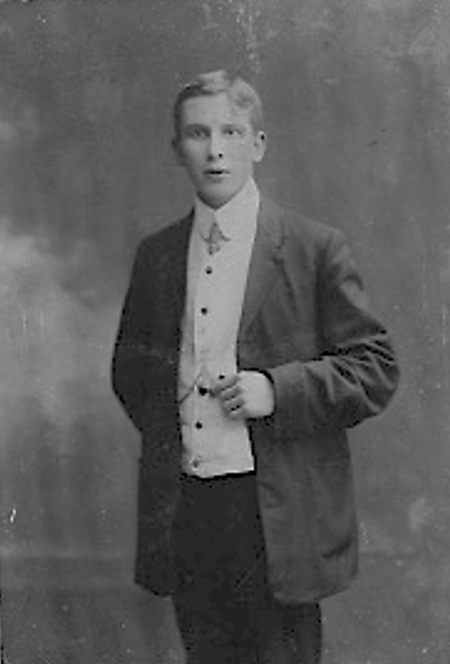Pte
John Gott
Information about birth
|
Year of birth: 1889 |
|
Place of birth: Willington, Durham, England, United Kingdom |
General information
|
Profession: Shop Assistant |
Army information
|
Country: England, United Kingdom |
|
Force: British Expeditionary Force |
|
Rank: Private |
|
Service number: 34501 |
|
Enlistment place: Bishop Auckland, Durham, England, United Kingdom |
|
Units: — Duke of Cornwall's Light Infantry, 1st Bn. (Last known unit) |
Information about death
|
Date of death: 04/10/1917 |
|
Place of death: Juniper Wood, Belgium |
|
Cause of death: Killed in action (K.I.A.) |
|
Age: 28 |
Memorial
|
Tyne Cot Memorial Panel: 81A |
Distinctions and medals 2
|
British War Medal Medal |
|
Victory Medal Medal |
Points of interest 2
| #1 | Place of birth | ||
| #2 | Enlistment place |
My story
Private John Gott was born in 1889 at Willington, Durham, England. He worked as a shop assistant prior to enlisting. John married Barbara Gott (nee Brookes) in 1911 and welcoming their first and only son Norman Richmond two years after in 1913.
He would eventually end up enlisting at Bishop Auckland, Durham and join up with the Royal Fusiliers and later the 6th Battalion Duke of Cornwall’s Light Infantry. Eventually he was part of the 1st Battalion Duke of Cornwall’s Light infantry (5th Division, 95th Brigade). As such private Gott took part in the Battle of Passchendaele in 1917.
On the night of the 3rd and 4th October 1917 the 1st Battalion Duke of Cornwall’s Light Infantry moved up to their assembly positions (Jut Farm to Reutel, Black Watch Corner) with headquarters in a pillbox at Cameron House. The assaulting waves went forward but eventually lost touch with their artillery barrage due to German machine gun and enfilade fire. Strong opposition was met from Cameron Covert and trenches west of Joist Farm. With the assistance of a tank the pill boxes at Cameron Covert were taken, but the tank eventually got stuck in the mud. After severe fighting in the beginning of the assault, the final objective on Juniper Hill was reached but could not be consolidated. The battalion was forced to take up a position from J.11.c.60.65 tot J.10.d.9.4. Many gave their lives that day, including Private John Gott who is now commemorated on the Tyne Cot Memorial, panel 81A, as his remains were never recovered or identified after the war.
In June 1919 a letter was send from a member of D Company, 6th DCLI (H. Maryon) asking if private Gott was ever in this battalion. After a relieve in October 1917 near Polygon Wood some of the men crawled out in no man’s land during the night and brought in several pay books and photos, telling that they saw the body of John Gott. He described John as a good-hearted chap whom he shared in many a parcel with.
He would eventually end up enlisting at Bishop Auckland, Durham and join up with the Royal Fusiliers and later the 6th Battalion Duke of Cornwall’s Light Infantry. Eventually he was part of the 1st Battalion Duke of Cornwall’s Light infantry (5th Division, 95th Brigade). As such private Gott took part in the Battle of Passchendaele in 1917.
On the night of the 3rd and 4th October 1917 the 1st Battalion Duke of Cornwall’s Light Infantry moved up to their assembly positions (Jut Farm to Reutel, Black Watch Corner) with headquarters in a pillbox at Cameron House. The assaulting waves went forward but eventually lost touch with their artillery barrage due to German machine gun and enfilade fire. Strong opposition was met from Cameron Covert and trenches west of Joist Farm. With the assistance of a tank the pill boxes at Cameron Covert were taken, but the tank eventually got stuck in the mud. After severe fighting in the beginning of the assault, the final objective on Juniper Hill was reached but could not be consolidated. The battalion was forced to take up a position from J.11.c.60.65 tot J.10.d.9.4. Many gave their lives that day, including Private John Gott who is now commemorated on the Tyne Cot Memorial, panel 81A, as his remains were never recovered or identified after the war.
In June 1919 a letter was send from a member of D Company, 6th DCLI (H. Maryon) asking if private Gott was ever in this battalion. After a relieve in October 1917 near Polygon Wood some of the men crawled out in no man’s land during the night and brought in several pay books and photos, telling that they saw the body of John Gott. He described John as a good-hearted chap whom he shared in many a parcel with.
Sources 2
|
95 Infantry Brigade: 1 Battalion Duke of Cornwall's Light Infantry, (The National Archives, KEW (TNA), WO 95/1577/5). https://discovery.nationalarchives.gov.uk/details/r/C14303 Sources used |
|
Everard Wyrall, The history of the Duke of Cornwall’s Light Infantry 1914-1919 (London: Methuen & Co. LTD., 1932), 282-5. Sources used |
More information 3
|
Commonwealth War Graves Commission Database https://www.cwgc.org/find-records/find-war-dead/casualty-details/840329 |
|
Namenlijst (In Flanders Fields Museum) https://namenlijst.org/publicsearch/#/person/_id=acc5e3e2-f43d-451f-a4d0-8290beb2b1ab |
|
Lives of the First World War (Imperial War Museum) https://livesofthefirstworldwar.iwm.org.uk/lifestory/1397858 |
